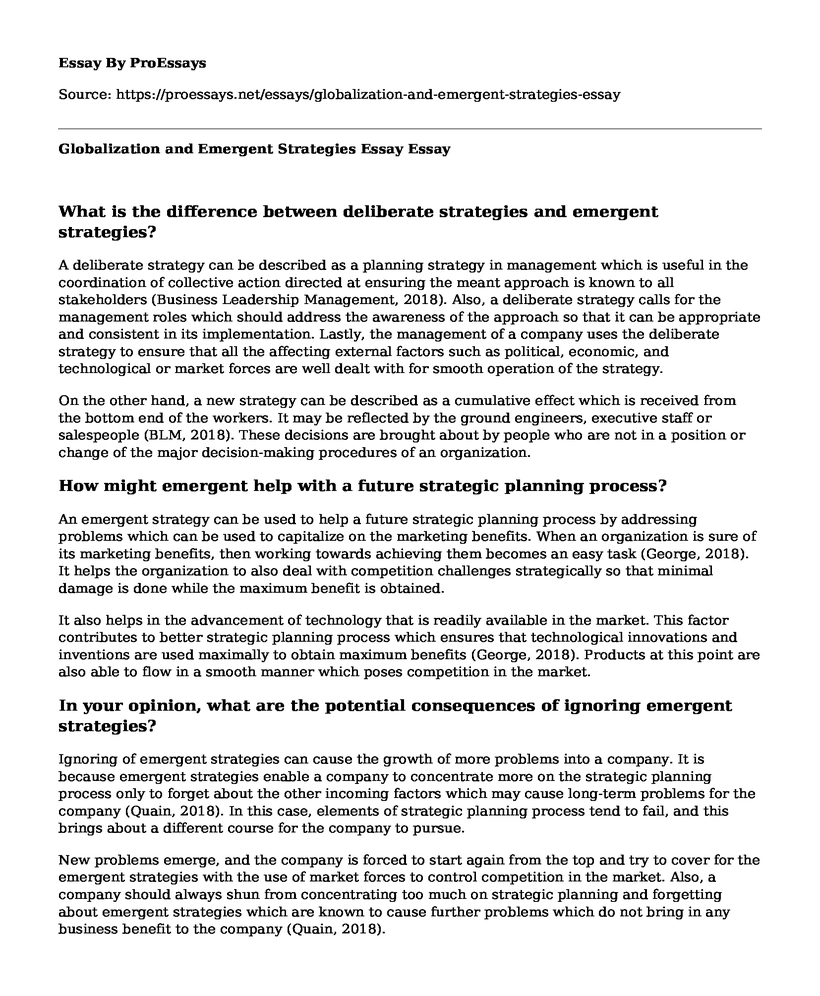What is the difference between deliberate strategies and emergent strategies?
A deliberate strategy can be described as a planning strategy in management which is useful in the coordination of collective action directed at ensuring the meant approach is known to all stakeholders (Business Leadership Management, 2018). Also, a deliberate strategy calls for the management roles which should address the awareness of the approach so that it can be appropriate and consistent in its implementation. Lastly, the management of a company uses the deliberate strategy to ensure that all the affecting external factors such as political, economic, and technological or market forces are well dealt with for smooth operation of the strategy.
On the other hand, a new strategy can be described as a cumulative effect which is received from the bottom end of the workers. It may be reflected by the ground engineers, executive staff or salespeople (BLM, 2018). These decisions are brought about by people who are not in a position or change of the major decision-making procedures of an organization.
How might emergent help with a future strategic planning process?
An emergent strategy can be used to help a future strategic planning process by addressing problems which can be used to capitalize on the marketing benefits. When an organization is sure of its marketing benefits, then working towards achieving them becomes an easy task (George, 2018). It helps the organization to also deal with competition challenges strategically so that minimal damage is done while the maximum benefit is obtained.
It also helps in the advancement of technology that is readily available in the market. This factor contributes to better strategic planning process which ensures that technological innovations and inventions are used maximally to obtain maximum benefits (George, 2018). Products at this point are also able to flow in a smooth manner which poses competition in the market.
In your opinion, what are the potential consequences of ignoring emergent strategies?
Ignoring of emergent strategies can cause the growth of more problems into a company. It is because emergent strategies enable a company to concentrate more on the strategic planning process only to forget about the other incoming factors which may cause long-term problems for the company (Quain, 2018). In this case, elements of strategic planning process tend to fail, and this brings about a different course for the company to pursue.
New problems emerge, and the company is forced to start again from the top and try to cover for the emergent strategies with the use of market forces to control competition in the market. Also, a company should always shun from concentrating too much on strategic planning and forgetting about emergent strategies which are known to cause further problems which do not bring in any business benefit to the company (Quain, 2018).
Globalization and International Markets
Choose two international strategies, compare and contrast them, and discuss why organizations may choose one strategy over another when expanding into the international market
Examples of international strategies include global and transnational strategies (Mastering Strategic Management, 2018).
A global strategy targets at making some modifications in all of a company's products so that it may gain more economies of scale from more markets around the world. These modifications are made in such a way that they are similar so that all customers may correctly identify with the products (MSM, 2018). An example of a company that applies this strategy is Microsoft.
On the other hand, a transnational strategy is one that requires a particular firm to apply a middle ground between the multi-domestic strategy and the global strategy so that clients may adjust their preferences especially in the local markets (MSM, 2018). For example, McDonald's and KFC have similar brand names and menus which they use around the world to keep their customers intact and satisfied.
A similarity between the above international strategies is that they both enable firms to seek globalization of their products and how best to remain relevant in the global markets around the world (MSM, 2018).
When expanding into the organizational markets, organizations may prefer the transnational strategy because it ensures that organizations can easily win over the local customers who influence others to reach to an international market (MSM, 2018). It is because it creates a link between the global strategy and the multi-domestic strategy to ensure that all local clients are well taken care of regarding their needs.
References
Business Leadership Management. (2018). "Deliberate VS Emergent Strategy." Business Leadership Management.
George, N. (2018). "Advantages & Disadvantages of Emergent Strategy." Chron.
Mastering Strategic Management. (2018). "Types of International Strategies." Mastering Strategic Management.
Quain, S. (2018). "Advantage & Disadvantage of Emergent Strategy." AZ Central.
Cite this page
Globalization and Emergent Strategies Essay. (2022, Jun 06). Retrieved from https://proessays.net/essays/globalization-and-emergent-strategies-essay
If you are the original author of this essay and no longer wish to have it published on the ProEssays website, please click below to request its removal:
- Team Work and Differences in Culture Essay
- Teamwork in Modern Organizations
- Vulnerability Management Development Paper Example
- Response to Post on Organizational Culture
- HRM Leaders: Study HRM and Leadership for Cultural Diversity - Essay Sample
- Essay Example on OSHA Compliance: Investigating Employee Complaints
- Essay Example on Unions' Strikes: A Visual Journey







